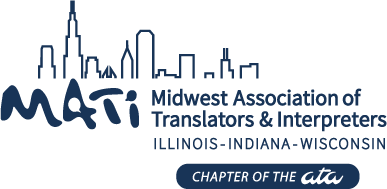Keynote Address by Katherine Allen on Technology and You
by Kathy Stokebrand
Kathy Stokebrand is a Spanish to English linguist. She has a BA from the University of Nebraska-Lincoln in Journalism and anticipates an MA in Language, Literature and Translation from the University of Wisconsin-Milwaukee in December 2014. Stokebrand has been a MATI member since 2012.
Mobility is the latest development in the evolution of technology, and Katharine Allen, professional interpreter and translator, reviewed some of the latest mobile tools for the industry at the MATI conference in September. Speaking in Madison at the Monona Terrace Convention Center, Allen led the program with her presentation, “Web 2.0, Mobile, and You: 21st Century Technology for Interpreters and Translators.”
“Our profession is online,” declared Allen, who has a master's degree in translation and interpretation and is co-president of InterpretAmerica, an organization dedicated to raising the profile of the interpreting industry. Hers was an urgent plea for translators and interpreters to get involved with technology tools. Professionals in the industry need to try things, to see what they like and dislike because, according to Allen, if translators and interpreters are not involved, the tools won't be tailored to them.
Technological advancement is nothing new, Allen noted, describing how tribes changed from a nomadic lifestyle to one based on agriculture. The industrial revolution followed that transition, taking about 100 years. Then, the digital revolution happened in the span of about 30 years, going from the typewriter to the computer.
Allen observed that now, the mobile revolution is in progress, beginning with the introduction of the iPhone in 2007, followed by the iPad in 2010 and Google glasses in 2013. The iWatch is set to be unveiled in 2015, she added.
Web 2.0 is the second stage of development for the World Wide Web, characterized especially by the change from static web pages to dynamic or user-generated content and the growth of social media. Users communicate, share content, and make the web their own, Allen said. Technology has provided access to an incredible amount of information, and interpreters and translators have to figure out how to leverage it, according to Allen. They need to learn how to filter the information and the tools to determine which will be most helpful to them.
Allen noted that this progress and the changes that have come with it have brought turmoil. Technological advances have sped up generational differences, she said, adding that adaptation is critical. There was a panic that translation would be taken over by software, as the industry has flipped to a digital-based model that some translators did not survive. Still, the Internet broke down barriers and borders, and after this period of transition, a new equilibrium has been achieved, she said.
The good news is that industry continues to grow because there are so many consumers who use other languages. However, Web 2.0, the mobile age and translation and web-based video will continue to spur change, Allen predicted. “There will be a lot of disruption,” she warned. Among the changes she foresees is greater prioritization of localization and a downward pressure on wages. Interpreters want on-site or face-to-face work situations but language-service buyers want telephonic and video-remote interpreting. End users want all of the above and more.
As Web 2.0 continues to evolve, Allen noted that she is starting to see a lot of hybrid products and situations, such as speech to text applications, voice-over subtitles, customer service chats and real-time emails. Technology has also changed the way in which translators and interpreters are found and are finding work, Allen said. She compared various online sites and directories, such a sProZ, LinkedIn and the American Translators Association. Some sites include more than 300,000 professionals, while others have fewer than 3,000.
Then, there are smart phone, what Allen calls “the great equalizer” because of what they offer to anyone who owns one. Smartphones allow access to the Internet, as well as helpful apps. They also have recording capabilities, allowing interpreters to listen to themselves and thus providing a valuable opportunity for self-evaluation. Additionally, smartphones have cameras and document readers that allow instant translation, albeit machine translation. Podcasts, which are available in many languages, provide an audio show on demand, and the next generation of this technology is vodcasting, also called video podcasting, in which video is added to the audio download of a podcast.
All and all, valuable resources are just a few clicks away. Allen recommends finding “favorites” to bookmark, such as high-quality glossaries and speech banks from, for example agencies of the United Nations, the US State Departments, the European Union and court systems. Allen noted that technology has also changed how translators and interpreters collaborate. Online groups, such as discussion forums, provide training and information, and while it's difficult to send a cold email asking for help or information, adding a post or ping on Facebook, LinkedIn or Twitter is much easier, providing almost instantaneous results.
In an industry dominated by free-lance contractors who are not able, or at least less likely, to organize and advance priorities for rates and work environments, online collaboration is so important, according to Allen.
